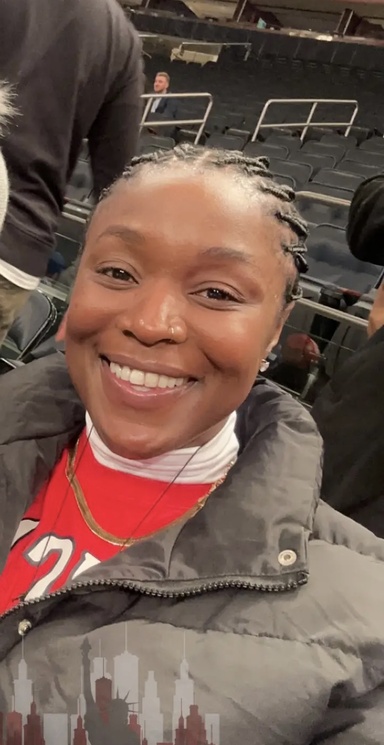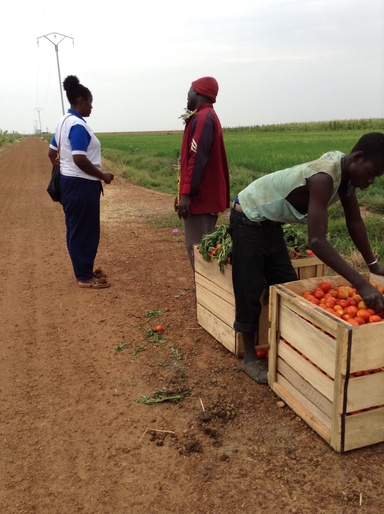
At age 33, Jayla Jones is starting physician assistant school a few years later than many of her classmates—but in many ways, her life experiences put her a step ahead.
Jones grew up in Addis, Louisiana, the child of two teachers. Her mom taught teens with intellectual disabilities, and Jones often volunteered with the class on community field trips to learn life skills like budgeting, grocery shopping, and applying for jobs.
“I knew that I didn’t want to teach, but I liked helping people. That was always really important to me,” she says.
At a career day event in fifth grade, Jones met an obstetrician-gynecologist and became fascinated by her stories about delivering babies. That night, Jones told her parents that she was going to be a doctor. Her commitment to pursuing a health care career has stayed constant ever since.
Throughout high school, she packed in as much health-related experience as she could with job shadowing opportunities and work in a hospital burn unit. Then, during her junior year of high school, she learned about the Peace Corps. She signed up the same day. In 2014, after completing her bachelor’s degree in biology at Xavier University, she began a 27-month stint working as an educator and clinic volunteer in Burkina Faso.
“It was hands down the greatest thing I’ve ever done in my life,” Jones says. “Don’t get me wrong—it was very hot, and I did not have running water or electricity. People say to me, ‘I could never do that.’ But when you get there, it somehow becomes easy. And the people there have been doing it their entire lives, so you can’t really complain.”
She went from knowing a bit of French from high school classes to using the language to communicate with middle-school students and patients every day. In Jones’ eyes, the chance to make a substantial difference in a developing community was worth all the challenges.

The experience was also a crash course on the social determinants of health and disparities in health care access. She recalls a situation where a family brought in a young boy who had contracted rabies from his unvaccinated dog. They had waited several days before seeking care, and his condition was severe.
“There are vets there, but [the boy’s family] did not have the money to keep up with vaccinations. So, they try to figure out [the boy’s illness] at home. They think maybe it’s a cold, or maybe he has malaria. They see that kind of stuff all the time,” Jones says. “Or they have to bike 15 minutes to the next village to get to the clinic. So, when they come to the clinic, it’s too late, and you have to have hard conversations with families. You have to understand that the access we have to care [in the United States] is truly a privilege.”
Some patients who visited the clinic were a bit more stable financially, which gave them the means to seek medical attention more quickly. The clear disparities caused by these differences were difficult to witness, but they helped Jones develop a deeper level of sensitivity for her patients’ circumstances.
“I learned how to navigate both sides of that spectrum, and to have grace for all situations,” Jones says. “No matter what situation you came from, whether you waited a day or you waited five days, you still are entitled to the same sort of health care as anybody.”
Jones’ firsthand experience treating communicable diseases in Burkina Faso—and contracting both malaria and dengue herself—sparked an interest in studying microbiology and immunology. After a master’s program at Tulane, she returned home to begin her new career. But soon after she arrived in August 2016, Baton Rouge was struck by catastrophic flooding.
“The flood destroyed a pretty large portion of the city,” Jones says. “I was readjusting to being back in the States, and then I had to adjust to the fact that home was not really home anymore.”
Jones worked as a shelter manager for her parish, helping operate community centers that serve as temporary homes for those displaced by natural disasters. When that service was complete, she started full-time work as a chemist.
“I’m very accustomed to a team setting and to sharing ideas, which I think is really going to lend itself to me being able to transition back to school,” she says. “I think the experience of working 12-hour shifts will also help me when I’m working in the health care field.”
She looks forward to being back in the classroom, honing the skills that she’ll need to succeed in the next chapter of her career.
“The excitement is very different when what you learn is specific to what you want to do,” Jones says.